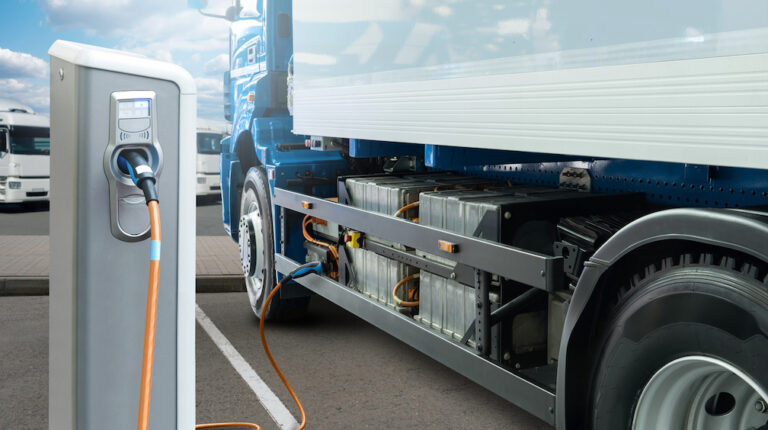WASHINGTON — Lawmakers introduced a bill in Congress on Wednesday titled the Fair Sharing of Highways and Roads for Electric Vehicles (Fair SHARE) Act.
The legislation’s sponsors U.S. Representative Dusty Johnson (R-S.D.) and Senator Deb Fischer (R-NE) introduced the bicameral Fair SHARE Act to impose one-time fees on electric vehicles (EVs) to ensure EVs contribute to the Highway Trust Fund (HTF) as internal combustion vehicles do.
“The Highway Trust Fund is on the road to insolvency,” Johnson said in a press release issued by his office. “It’s time to consider real changes and ensure EVs pay their fair share to maintain our roads and bridges. I’m grateful for Senator Fischer’s leadership on this bill that will undoubtedly create a more stable Highway Trust Fund, ensuring the government can continue to make meaningful investments in our road infrastructure needs.”
Fischer’s office followed suit with a statement of its own.
“EVs can weigh up to three times as much as gas-powered cars, creating more wear and tear on our roads and bridges,” Fischer said. “It’s only fair that they pay into the Highway Trust Fund just like other cars do. The Fair SHARE Act will require EVs to pay their fair share for the upkeep of America’s infrastructure.”
Some heavy hitters in the trucking industry followed suit with support including the American Trucking Association. The ATA’s Senior VP of Legislative and Government Affairs Henry Hanscom had strong words of support for the bill.
“All Americans benefit from a robust and safe transportation system. When it comes to paying for the maintenance and expansion of our road network, no one should get a free ride,” Hanscom said. “The trucking industry makes up just four percent of the vehicles on our nation’s highways, yet we pay nearly half the tab into the federal Highway Trust Fund—all while moving over 70 percent of the domestic freight tonnage. Clearly trucks are doing their part to invest in the nation’s infrastructure, and it is reasonable to expect electric vehicles to do the same. As fuel efficiency rises and adoption rates for alternative fuels accelerate, we must find long-term, sustainable, and equitable sources of revenue for the HTF. We commend Senator Deb Fischer and Congressman Dusty Johnson for leading this effort to ensure that electric vehicles are paying their fair share.”
“For nearly 70 years, purchasers of gasoline, diesel, gasohol, liquified natural gas and liquified petroleum gas have supported the maintenance and improvement of the nation’s roads and bridges,” said Dave Bauer, President and CEO of American Road & Transportation Builders Association. “The lone exception to this user-fairness principle remains vehicles powered by electricity. Thankfully, Senator Fischer and Representative Johnson have introduced the Fair SHARE Act to correct this oversight and improve mobility for all Americans.”
“This measure will provide a sustainable, long-term revenue stream to the Highway Trust Fund, allowing the construction employers to maintain and rebuild our nation’s roads and bridges,” said Jeff Shoaf, CEO of The Associated General Contractors of America. “The legislation will close a loophole for electric vehicles, which currently do not currently contribute to the Fund. Instead of giving them a free ride, this measure simply asked electric vehicle users to take part in the same user-pay approach that enabled the U.S. to build and maintain the highway network.”
The Owner-Operator Independent Drivers Association (OOIDA) today announced its support for the measure.
“America’s truckers are the backbone of our supply chain and make significant contributions to maintaining our roads and bridges by paying several taxes that support the Highway Trust Fund,” said OOIDA President Todd Spencer.“However, truckers are understandably frustrated that EVs currently pay nothing to the HTF despite having equal access to the roads and highways maintained by taxpayers. OOIDA and the 150,000 truckers we represent appreciate the leadership of Senator Fischer and Representative Johnson in ensuring fairness on America’s roadways. We understand the importance of investing in the vital infrastructure that keeps our economy moving.”
What does the Fair Sharing of Highways and Roads for Electric Vehicles Act (Fair SHARE Act) do?
- Impose a one-time fee of $1,000 on all-electric vehicles at the manufacturer level, at the point of sale. This fee would be appropriated to the HTF.
- The $1,000 fee is derived from the average amount consumers currently contribute to the HTF from gas taxes calculated over a span of 10 years. Internal combustion engines have an average lifespan of 100,000 miles, which equates to approximately 10 years. According to the Congressional Budget Office, light-duty vehicles typically contribute an average of $100 per year to the HTF. The average lifespan of an electric battery is 10-15 years. A comparable fee over 10 years for an EV would amount to around $1,000.
- Impose a one-time fee of $550 on each battery module with a weight greater than 1,000 pounds to be imposed at the manufacturing level and would be appropriated to the HTF.
The Fair SHARE Act is cosponsored by U.S. Senators Pete Ricketts (R-NE) and Cinthia Lummis (R-WY), and U.S. Representative Dave Taylor (R-OH)
What is the Highway Trust Fund?
The Highway Trust Fund (HTF) supports over 90 percent of federal highway aid to states. The HTF was meant to be funded primarily by federal gas tax. The HTF now faces insolvency. Projections from the Congressional Budget Office show the HTF becoming insolvent in 2028.
The HTF instability has worsened due to EV adoption, which is being encouraged at the federal level through tax incentives. Because EVs do not use gas, they do not contribute to the HTF through the federal gas tax. However, since the gas tax was last raised in 1993, the HTF faces insolvency due to more fuel-efficient vehicles on the roads, leading to reduced fuel consumption.
EVs are not subject to the gas tax and do not contribute to the HTF. Furthermore, their heavy batteries (up to triple the weight of gas-powered cars) lead to more extensive road wear, causing more maintenance and greater costs.
This legislation would fix this discrepancy by implementing a fee at the manufacturer level at the point of sale of EVs. This ensures that every vehicle on the road is paying into the HTF and supporting critical repairs to America’s infrastructure.
Bruce Guthrie is an award-winning journalist who has lived in three states including Arkansas, Missouri and Georgia. During his nearly 20-year career, Bruce has served as managing editor and sports editor for numerous publications. He and his wife, Dana, who is also a journalist, are based in Carrollton, Georgia.






